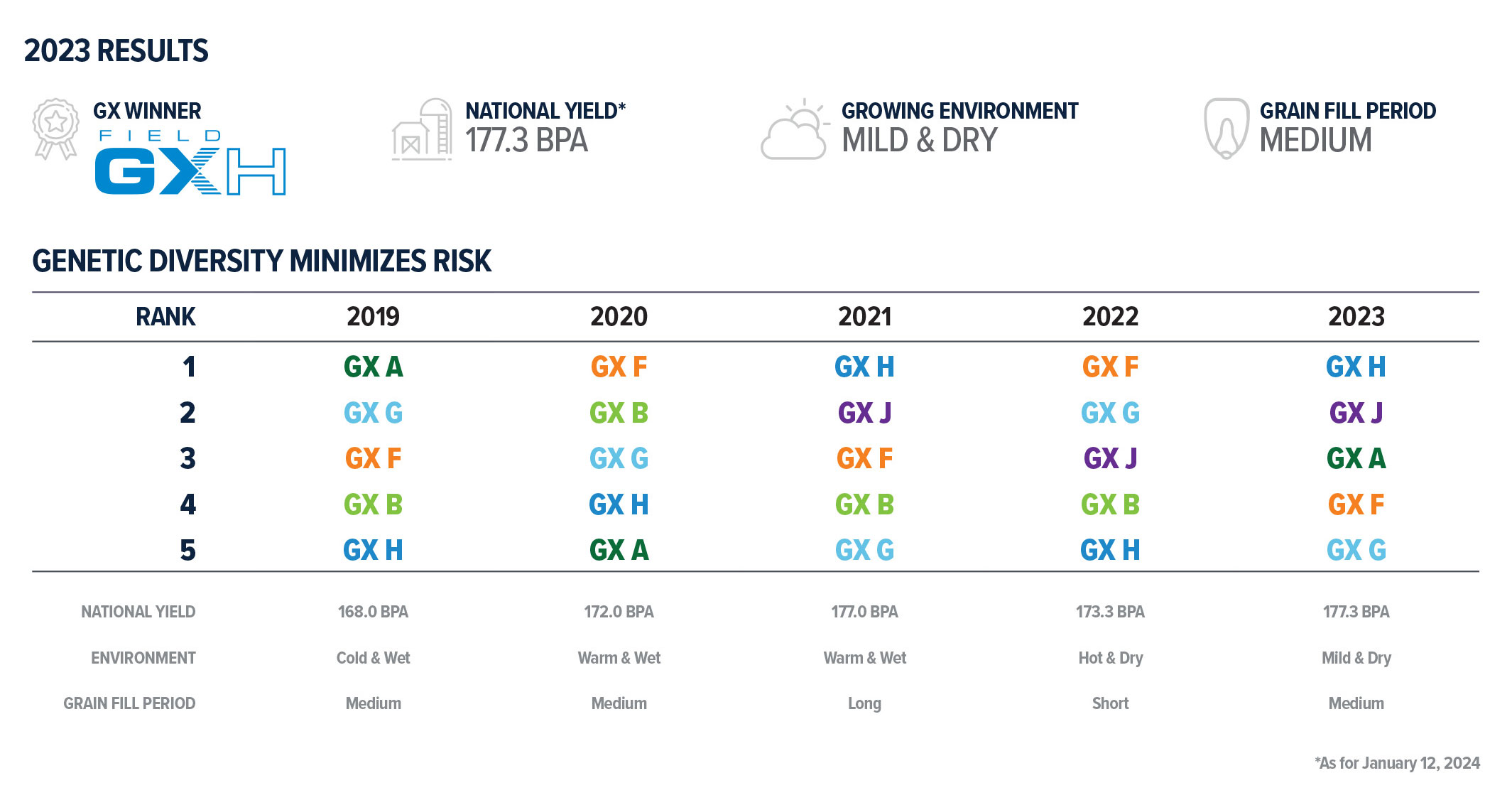At the end of each growing season, AgriGold ranks its Field GX™ genetic families by overall performance. Family H topped the list for 2023, but don’t take that as a nudge to go all in on Family H in 2024. AgriGold ranks its corn hybrid families not to point farmers toward any one family, but rather to showcase how much the leaderboard changes from year to year.

“We all tend to see what worked last year and say, ‘Well, let’s do that again,’ expecting the same results,” says AgriGold Product Manager Steve Schany. “But it rarely works out that way; there’s just an 11.3% chance that Family H will repeat and come out on top in 2024.”
The one thing I can guarantee is this year’s rankings will be different than the previous year,” Schany says. “The reason we rank families is to emphasize the need for genetic diversity in farmers’ seed strategies. Planting products with different genetic backgrounds better prepares them for whatever the 2024 growing season holds.”
Use the rankings as a report card
Schany recommends farmers use the annual rankings of Field GX families as a report card that sheds light on how and why things turned out as they did.
Family H performed well across the AgriGold portfolio in 2023. “The family not only had the most wins, but several products within the family also were truly dominant, outyielding our plot average by more than 5 bushels an acre,” Schany says.
“These outperformers were very offensive hybrids, and all the stars aligned to create the perfect environment for them,” Schany explains. “They got the right weather and the right precipitation at the right time.”
That doesn’t discredit other hybrid families. “Had rain not fallen when it did, the rankings could have looked completely different,” Schany says.
“The top three families – H, J and A – handled this season’s challenges of a cool spring and bouts of dryness well.”
What to look for when choosing products
Schany recommends farmers make sure their seed portfolio includes at least three different genetic families. He adds, “If you can handle more, that’s even better.”
AgriGold developed the Field GX family format to make it simple and intuitive for farmers to understand hybrids’ genetic differences and choose products that are genetically diverse. “The groupings provide a simple way for farmers to know they are managing risk by having genetic diversity in the field.”
Don’t get hung up on what families complement one another. “All families are great companions,” Schany says. “It’s more about finding hybrids from several families that offer the benefits and protections farmers need and work with their management style and growing zone.
“If farmers can diversify and select products that work with their management style, that will help them succeed,” he adds.
Look for areas to improve
As farmers look ahead to 2024, Schany encourages them to think through the season they just had and anticipate potential challenges for the year ahead.
“Take a step back and look at what you went through this past year. Consider where you might improve,” he advises. “Whether that’s picking a better, more diverse set of hybrids, eliminating weed pressure or improving stand establishment by working on your planter, there’s always something that can be improved.”
Consider likely threats
Next, Schany says farmers should think through some of the likely challenges for the coming season, noting drought and insect pressure are potential threats. “We need a cold winter to reduce insect populations. So far, this winter has been mild,” he says. Corn rootworm, in particular, is top of mind for farmers.
“AgriGold offers traits like SmartStax® PRO and DuracadeViptera™ that give farmers another way to diversify and protect against corn rootworm,” Schany says. He encourages farmers to think through resistance management and the benefits of rotating traits to keep corn rootworm from becoming an even bigger problem.
A dry fall signals drought is another possible threat, with Schany pointing out droughts start in the fall, not the spring. Farmers in areas that have been dry should consider hybrids from the Field GX families with stress and drought tolerance.
“Family G has some of our best products for tolerating stress and drought,” Schany says, adding that Family H and Family J also have some strong contenders.
Ultimately, the best defense is to spread risk by planting hybrids from several genetic families. Reach out to your local AgriGold agronomist for support in making those choices.

